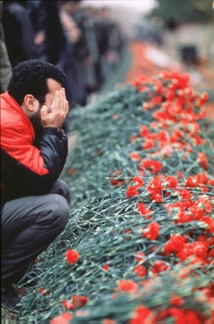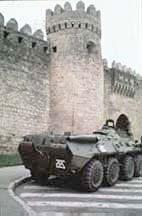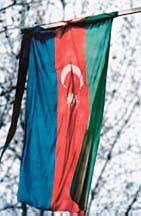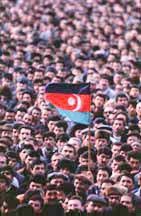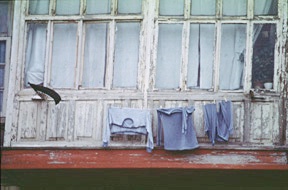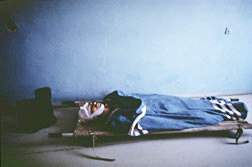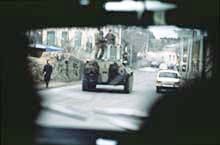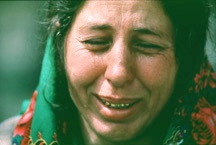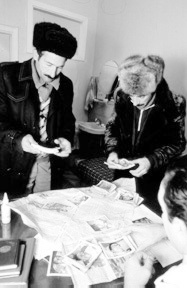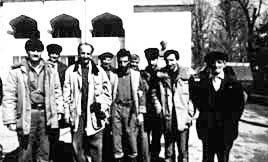|
Spring 1998 (6.1) Black January:
Baku (1990) by Reza with Betty Blair
To add to the record [January 15, 2008]: This note from Ramiz Abutalibov, who represented Azerbaijan at UNESCO during the Soviet period. "Concerning the trip that
Reza made to investigate the Black January 1990 events. There
were three journalists from Paris: Reza, Ahmed Sel and Ms. Shirin
Malikova. I got them visas in Soviet Consular in Paris to Moscow,
which was very difficult to do at that time. Then Rustam Ibrahimbeyov
[famous filmmaker] organized their trip to Baku by train. My
daughter Nigar Abutalibova met them in Baku and helped with arrangements
for a car and their program in Baku. All these preparations behind
the scenes were a mutual effort and involved several of us."
Black January turned out to be the beginning of the end of Soviet rule in Azerbaijan. Communist party members who had devoted their lives to serving the interests of the USSR, were appalled to find the System turning against them. Stories abound of Party members setting fire to their IDs. Azerbaijan's current President, Heydar Aliyev, a former member of the Politburo, waged a scathing attack on Gorbachev, accusing him of masterminding this heinous crime. But throughout the confusion and turmoil, the Soviets managed to suppress all efforts to disseminate the news to the international community. There were two notable exceptions: Mirza Khazar and his small team at Radio Liberty (U.S.-sponsored) who broadcasted daily reports from Baku [See Radio Liberty] and the efforts of the world-renown photojournalist, who for the sake of simplicity, goes by the name, Reza. The following article describes Reza's efforts to smuggle himself into Baku during those turbulent days and get the story out to the world. His story reads like fiction or a Hollywood screenplay. But the scenario is real. Reza lived through all of these tense and historic-packed moments described below. _____________ Moscow - January 22, 1990. I'll never forget those days. More than 50 international journalists and photographers, including those representing some of the best-known names in the business - CNN, ABC, CBS, NBC, Reuters, AP - had checked into the Moscow Hotel. I was among them. I and two other colleagues had just arrived from Paris. Something was happening in Baku. We didn't quite know what. We had heard that demonstrations were taking place in the streets and that Soviet troops had moved in. Beyond that, we could only speculate. It seems the Soviets feared an independence movement was afoot in Azerbaijan. They sought to crush it before it gained momentum. Don't forget - those were the days of Gorbachev and Perestroika. Only a few months earlier, the world had watched the domino effect taking place as Central Europe gained its freedom - the Berlin Wall, then Poland, Hungary and Czechoslovakia. Don't forget that the Soviets with the world's largest military complex had also been forced to withdraw in the face of the unrelenting Afghan guerrillas. I had been catching snatches
of news on the wire services in Paris. Being a photographer,
part of my work is to anticipate clashes and upheavals before
they occur. What good is to arrive when the action is over. That's
what photography is all about. A journalist can follow on the
scene later on and draw upon many analytical sources, but a photographer
has to capture the spontaneity of the moment. Left: Tanks in the streets outside the citadel gates of the Old City of Baku, January 1990 by Reza. Center: Improvised Azerbaijan flag. The official flag during Soviet period had an all red field. The Flag Azerbaijan adopted after independence (late 1991) included blue (Turkic) and green (Islam). Note the black strip of cloth signifying mourning and protest of the Soviet invasion of Baku on January 20,1990. Photos: Reza. Right: Home-made flag carried by demonstrators
expressing the desire for independence two years before the collapse
of the Soviet Union in late 1991.
Left: Thousands of people hung black strips of cloth from their apartments in protest of the Soviet invasion of Baku on January 20, 1990. Photos: Reza. Right: Wounded soldier of the Karabakh war. Agdam. April 1992.
Left: Photo secretly taken through the windshield
of a car of the presence of Soviet tanks in Baku during the week
of January 20, 1990. Photo: Reza
In 1988, I had visited Baku on the occasion of the 150th Jubilee of the great playwright, Mirza Fatali Akhundov. It was there that I met many prominent artists and writers, one of which was Rustam Ibrahimbeyov. A prominent writer, Rustam would go on to write the screenplay for "Burnt by the Sun," winner of the 1995 Oscar for the "Best Foreign Film." [See AI 3.2, Summer 1995]. Rustam would turn out to be a pivotal member in our quest to smuggle ourselves into Baku. I had called Rustam in Moscow some days earlier when I wasn't able to reach Baku. He had confirmed my suspicions that the situation was serious. "It could turn into a very bad situation," he had told me in very cautious, cryptic Azeri. I had to call him back twice. Another number, another time. Being a journalist, you pick up on things like this very quickly. Now with visas for Moscow in hand, I called Rustam again. "I'm coming with two friends. I'd love to see you and have dinner together." "Yes," he replied," it's the right time to come because 'our friends' are already in!" (meaning that the Soviet troops had already moved into Baku). Our Paris team arrived in Moscow on January 21st. Rustam was perplexed. He saw no solution for getting to Baku. Now that the troops and tanks were in Baku, all the roads would be blocked, and it would be very dangerous to travel.
Back at the hotel that evening, word spread that Moscow's press officials had organized to fly all the journalists to Baku the next day. We were told to meet in the hotel lobby at 9 o'clock the next morning (January 23). "Are you sure they plan to take us to Baku?" I had asked some of the other journalists. They were sure. And I was equally sure they wouldn't. Having spent more than five years (1983-1988) on assignment with Time Magazine with Afghan guerrilla fighters in the mountains of Pakistan and Afghanistan if there was one thing I had learned, it was: "Never trust Soviet officials when they make irresistible offers." Local Train to Baku
Back at the hotel while we were gone, Rustam arranged for someone to mess up our rooms every day and make them look "lived in." We had to keep up the pretense that we had not checked out in order not to arouse suspicion. Remember, our visas were only for Moscow. Kamal, Rustam's friend accompanied us on the train. Our first task was to learn a few Russian phrases: "Ya pa rusky niz naya" (I don't speak Russian) and "Ya Azerbaijani" (I'm Azerbaijani). I was concerned that I didn't know Russian. Kamal assured me that many Azeris in the countryside didn't know Russian either so I could get by. But if anyone ever stopped us for our papers, we knew that would be the end. We did our best to dress like the locals - to blend in, to appear so ordinary that we would be overlooked and ignored. Shirin spoke fluent Russian and Azeri as well as French. Ahmad's Turkish accent was quite obvious, but Russians didn't know the difference. It was a long ride. Fortunately, we had our own compartment. Whenever a controller came along, Kamal would warn us and we would quickly crawl up into the luggage compartment and hide. Sometimes, when we were sleeping, he would bribe the officer and request that we not be bothered. One of our biggest problems involved the toilets, located in the main section of train. We didn't want to get ourselves in a situation where we had to speak to anyone so Kamal would wait outside our compartment and signal when it was clear to head down the corridor. Baku-At Last! Those tall, husky Russian soldiers standing there with their big bulky overcoats and fur hats, cradling their machine guns - silhouetted against the darkness of that chilly night. They looked so huge - so foreboding, so threatening. I remember looking at Ahmad and Shirin with horror in my eyes, "I think they're going to catch us. We'll have to pass through that wall!" It wasn't that I was scared of being arrested. That comes with the territory when you're a photojournalist. You know it can happen - getting arrested, beat up. What I feared most was not being able to get the story, especially since I was Azerbaijani, myself, I wanted to be part of telling the world this story. The train came to a halt. We were hoping that Rustam had succeeded in arranging for someone to meet us. Suddenly, in the crowd I spotted Elinora Huseinova (now Ambassador to France) with a couple of her girlfriends. She jumped up on the train, her arms full of flowers - roses - not the red carnations that were being used for mourning those days. She gave me a big hug and whispered in my ear, "Put your cameras and luggage in the compartment. Come out with me. Don't carry anything." And so we did. She slipped her arm through mine; the other ladies latched on to Ahmad and Shirin. With arms full of flowers, acting as lovers reunited, we walked right past that long line of soldiers. Some gave us knowing nods, as if to say, "Hey, you guys - you lovers - have a great time! We won't bother you. Get along!" Get on with it!" Despite how nerve-wracking that experience had been, more unsettling was the realization that so many plainclothesmen had been traveling on the train with us. When they got off, they flashed their IDs to the soldiers and immediately started motioned some of the passengers over to the side. It was so well organized and well-orchestrated that it was frightening. A car was waiting for us. We went to dinner at someone's home. It was a wonderful meal, especially after traveling for two or three days when we had had so little to eat. It was good to be in Baku. Friends of Ramiz Abutallibov (now with the Ministry of Foreign Affairs) and Elinora gathered round that night. Ahmad wanted to film them. "No way, man!" they had replied. "Come on! We'll get caught. You can't film us. We're just here to talk about these things and take you to different places." They knew how important our mission was and were committed to getting the story out to the world. They showed us a map of the city, pointing out exactly where everything was happening and where the troops and tanks were located. I remember the TV blasting away in the living room. The chief commander of curfew, a Russian, droned on, trying to convince everyone that everything was under control - that nothing was happening. Everybody ignored his platitudes; we all knew better. We only got about two or three hours of sleep that night. All evening we talked and talked, making plans. I'll never forget how sad everybody was. I've visited more than 85 countries in my lifetime, but I would have to admit that during those days, Baku was the saddest city I had ever seen in all my life. The people were in a daze, totally shocked and disoriented. It was incomprehensible to them that the Russians had orchestrated an attack on them and killed innocent people. After all, they had been taught for 70 years about the great brotherhood of the Soviet Union. Just Like a Divorce During the early demonstrations, Azerbaijanis had sought better relations with the Soviets because they believed in the relationship. After Black January, they knew the relationship was over. The Assignment We first headed off to the hospitals. I'll never forget the horror that filled those halls. The rooms were so crowded, the wounded and dying were lying, unattended, in the corridors. We knew it would be hard to get inside the hospitals undetected since the entrances were all guarded by police. I kept telling hospital personnel that I was looking for a friend who had had surgery a few days earlier. "He wasn't wounded," I had explained. "It had nothing to do with these latest incidents." Of course, we didn't dare walk in carrying our camera equipment ourselves. So one of "our scouts" would go in first, check the place out and persuade some little old ladies - peasants - to come out and we would stuff our bags down into their larger bag, and off they would go walking right through the hospital entrance for us. We found it was safest to photograph inside the operating rooms. Our scout would check if a room was safe. If so, we would slip in and close the door. One of the surgeons told us that more than 300 people had been killed and more than a thousand wounded. Unfortunately, many of those injured would die of their wounds. After a few hours, we decided to head out in search of the tanks. We found them in an open area, but it was impossible to photograph without being detected. We hit upon the idea of taking photos from an apartment opposite the parking area. One of our "scouts" checked out the situation. Soon he was back and we were climbing up to the eighth floor. Again, no cameras. Someone followed later with our bags. But despite how clear the view was from the top, we knew it was too risky. The soldiers could have spotted us too easily. I decided to suggest that the lady of the house go out on her balcony and pretend to be washing the windows. From inside, we could then aim our telephotos at the soldiers and tanks below when she raised her arms to wipe the glass. Her body would shield us from view. She agreed. It worked. We got the photos we wanted. Actually, our "cleaning lady" quite enjoyed the attention. She kept saying, "I'm in a movie! I'm in a movie!" It was all very funny. But her husband feared that the soldiers would aim their guns at the apartment, or that someone would come up and arrest him. Innocent people were being shot on their balconies those days. Down in the streets again, I
knew I had to make every photo count as I was deliberately traveling
very light and had only seven or eight rolls of film. Soldiers
were patrolling the streets. Tanks rolled by. Looking up at the
apartments, we could see black strips of cloth hanging down,
symbolizing solidarity for those who had died. Black was all
over the place. It seemed the Azerbaijanis were not afraid of
making such symbolic protests. Next, we went to a morgue. Again, the entrance was blocked. This time they were checking IDs and writing down the names of everyone who came to identify the bodies. But there was one room that we managed to enter. In the center of the room on a table there were photographs of the corpses. People came in, picked them up in their hands, desperately searching for their loved ones, though hoping not to find them there. We learned that on the next day there would be a huge gathering at Shahidlar Hiyabani (Martyr's Cemetery). It would give us the chance to be among the people, to witness their emotions. We knew we would be able to photograph freely. It didn't even matter if the guy standing right next to us was KGB or not. He wouldn't dare cause any trouble for fear of being attacked by the masses. But we knew not to take chances. We knew we would have to disappear before the crowd dispersed so no one could follow us. We even organized a little escape scenario. After the cemetery scenes, we felt we had enough photos. We had already spent three days and two nights in Baku. It was time to leave. I don't quite know how our friends managed it, but soon we had a fake entrance visas along with tickets for the flight back to Moscow. Officially, remember, we had not really entered Azerbaijan. As with everything else that had happened in Baku, we had to put our total trust in others even to be able to leave the country. As before, we didn't dare carry our cameras, videos or films with us on the plane. We were told someone on the plane would carry our equipment for us. We didn't know who. Enroute, however, two Russian girls came up and started talking to us. We were suspicious since we had heard so many stories about blonde Russian girls. "Oh no," we told ourselves. "It's the KGB! They've finally caught up with us." One girl spoke Azeri and made reference to films. We totally denied knowing anything that related to photography. "What films?" we asked. But it turned out these were the passengers doing us the favor of carrying our stuff in their suitcases for us. They had really given us a scare. Back at the Moscow Hotel, we got the films from the girls and headed straight for the airport. We also found out what happened to the journalists who had taken the flight to Baku. Just as I had suspected, none of the journalists succeeded in getting to Baku. It seems that when the plane was in mid-air, flying over the Caucasus, the pilot announced that unfortunately, Baku's airport has been shut down and that he would have to divert the plane to the nearest airport. How convenient that it just happened to be Yerevan (Armenia) where the Soviet press had already arranged for newly arrived Armenian refugees fleeing Azerbaijan to tell the international media their version of how savage Azerbaijanis were. Once again, the Soviets had duped the international press. The only story that the press could take back home was exactly the one that the Soviets had wanted them to tell, which further justified the need for troops to crush those unruly Azerbaijanis. The realization gradually dawned upon us that not a single journalist had succeeded in getting to Baku except us. Looking back to those days in Baku, I'd have to admit that despite all the years working in difficult places, I was terribly afraid something would happen to us in Azerbaijan - that, somehow, we would disappear. After all, we were witnessing events and gathering information that the whole Empire was denying, and that the whole world was waiting to hear. We were the only ones who were carrying the story out. When the plane took off from Moscow, we all looked at each other. I'll never forget the incredible relief and joy that was in our eyes. It had been a tough seven days. We were finally taking off for Paris. I couldn't believe we had made it. Back in Paris The TV was on the lab when I started processing the slides. Then I heard a voice, announcing that at 8 o'clock there would be a very important news broadcast. Tears came to my eyes. It meant Ahmad's videos were safe. That night, the news opened with the tragic events that were unfolding in Baku as the first item. They gave five or six minutes coverage, incredibly long by Western standards when the usual item runs 30 seconds to a minute. My slides came out fine, too. I selected about 40 of them to be duplicated for distribution. I gave them to an agency who could transmit them to 2,000 magazines and newspapers all over the world. And so it was: within 24 hours after we returned home, the tragic story of Azerbaijan's Black January had been distributed around the world. More than 18 TV channels and tens of radio stations were calling us for footage. Mission completed. Black January was no longer a secret - the world was watching. For the past 20 years, "Reza" prides himself that he has covered every major war and conflict in the Middle East except Chechnya. His works are published in some of the most reputable news agencies and magazines in the world, including Newsweek, Time, Paris Match, Stern and National Geographic. The day we were going to press (mid-April) with this issue, Reza was on his way to Afghanistan, India, Pakistan, Sri Lanka and Thailand on a 10-day tour, accompanying Bill Richardson, the U.S. Ambassador to the United Nations. The New York Times Magazine had commissioned Reza to cover the story. Betty Blair is editor of
Azerbaijan International. |


